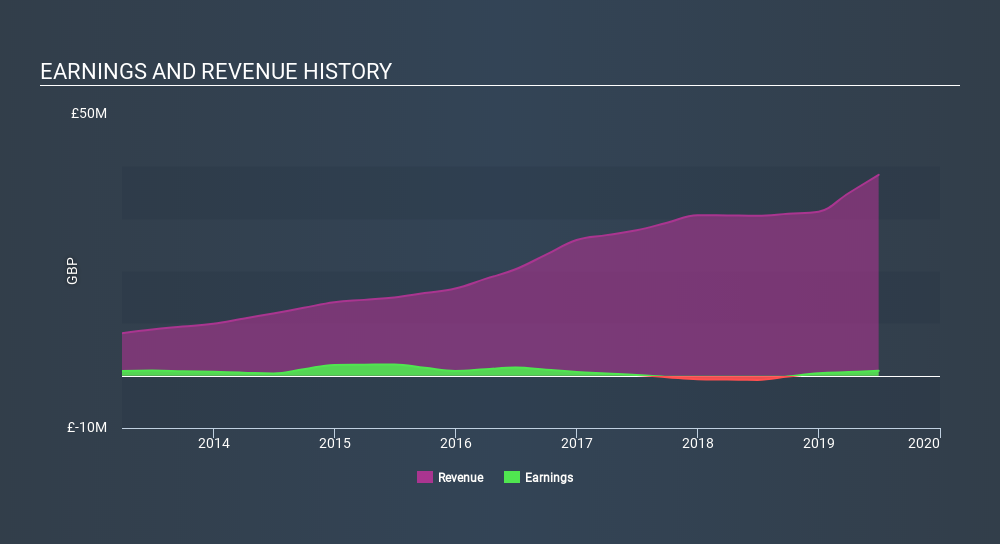- United Kingdom
- /
- Insurance
- /
- AIM:HUW
Volatility 101: Should Helios Underwriting (LON:HUW) Shares Have Dropped 23%?
The main aim of stock picking is to find the market-beating stocks. But every investor is virtually certain to have both over-performing and under-performing stocks. At this point some shareholders may be questioning their investment in Helios Underwriting Plc (LON:HUW), since the last five years saw the share price fall 23%. Unfortunately the share price momentum is still quite negative, with prices down 11% in thirty days. But this could be related to poor market conditions -- stocks are down 29% in the same time.
View our latest analysis for Helios Underwriting
While markets are a powerful pricing mechanism, share prices reflect investor sentiment, not just underlying business performance. By comparing earnings per share (EPS) and share price changes over time, we can get a feel for how investor attitudes to a company have morphed over time.
Helios Underwriting became profitable within the last five years. Most would consider that to be a good thing, so it's counter-intuitive to see the share price declining. Other metrics might give us a better handle on how its value is changing over time.
We don't think that the 1.2% is big factor in the share price, since it's quite small, as dividends go. In contrast to the share price, revenue has actually increased by 22% a year in the five year period. So it seems one might have to take closer look at the fundamentals to understand why the share price languishes. After all, there may be an opportunity.
The graphic below depicts how earnings and revenue have changed over time (unveil the exact values by clicking on the image).

We know that Helios Underwriting has improved its bottom line lately, but what does the future have in store? If you are thinking of buying or selling Helios Underwriting stock, you should check out this free report showing analyst profit forecasts.
What About Dividends?
When looking at investment returns, it is important to consider the difference between total shareholder return (TSR) and share price return. The TSR is a return calculation that accounts for the value of cash dividends (assuming that any dividend received was reinvested) and the calculated value of any discounted capital raisings and spin-offs. So for companies that pay a generous dividend, the TSR is often a lot higher than the share price return. As it happens, Helios Underwriting's TSR for the last 5 years was -13%, which exceeds the share price return mentioned earlier. And there's no prize for guessing that the dividend payments largely explain the divergence!
A Different Perspective
While it's never nice to take a loss, Helios Underwriting shareholders can take comfort that , including dividends, their trailing twelve month loss of 5.8% wasn't as bad as the market loss of around 20%. Unfortunately, last year's performance may indicate unresolved challenges, given that it's worse than the annualised loss of 2.7% over the last half decade. Whilst Baron Rothschild does tell the investor "buy when there's blood in the streets, even if the blood is your own", buyers would need to examine the data carefully to be comfortable that the business itself is sound. It's always interesting to track share price performance over the longer term. But to understand Helios Underwriting better, we need to consider many other factors. Even so, be aware that Helios Underwriting is showing 3 warning signs in our investment analysis , and 1 of those is concerning...
If you are like me, then you will not want to miss this free list of growing companies that insiders are buying.
Please note, the market returns quoted in this article reflect the market weighted average returns of stocks that currently trade on GB exchanges.
If you spot an error that warrants correction, please contact the editor at editorial-team@simplywallst.com. This article by Simply Wall St is general in nature. It does not constitute a recommendation to buy or sell any stock, and does not take account of your objectives, or your financial situation. Simply Wall St has no position in the stocks mentioned.
We aim to bring you long-term focused research analysis driven by fundamental data. Note that our analysis may not factor in the latest price-sensitive company announcements or qualitative material. Thank you for reading.
About AIM:HUW
Helios Underwriting
Provides a limited liability investment for its shareholders in the Lloyd’s insurance market in the United Kingdom.
Undervalued with adequate balance sheet and pays a dividend.
Similar Companies
Market Insights
Community Narratives



